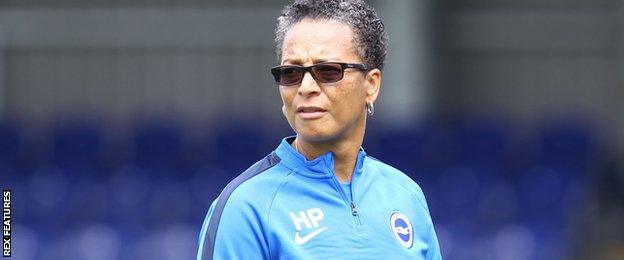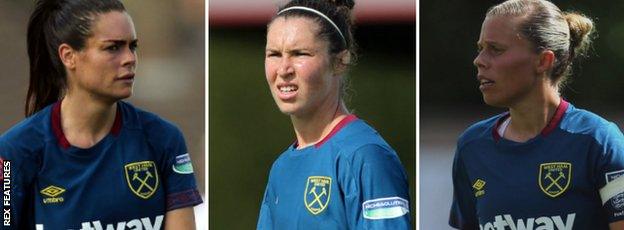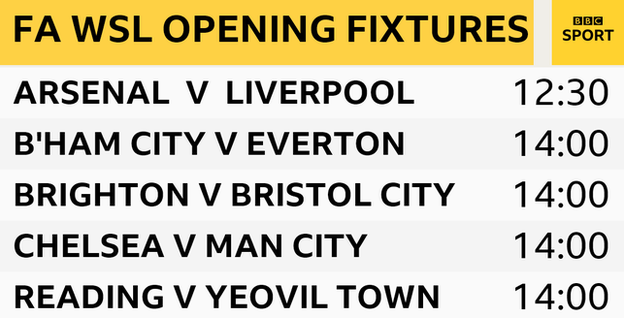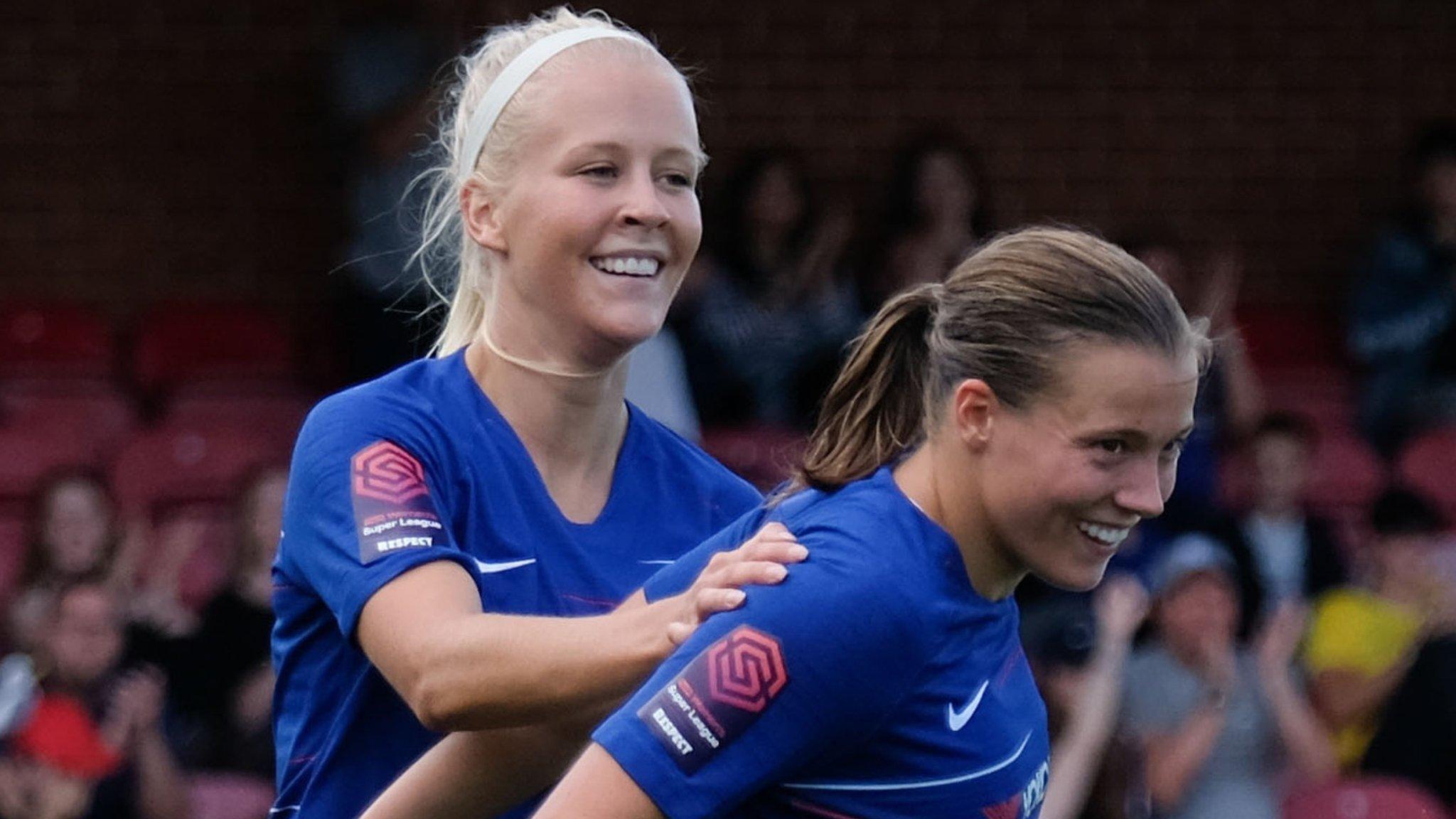Women's Super League: New full-time, professional era - all you need to know
- Published
- comments
Nobbs & fellow players excited for new WSL season
Various sports often herald a new season as being "the biggest yet", but rarely has any competition witnessed as much change as the Women's Super League has this summer.
After a transition to full-time, professional status, the restructured one-tier, 11-team WSL starts on Sunday.
With new teams, new rules and some new managers, plus Manchester United's return to the senior women's game, the 2018-19 campaign promises much.
So, after England and Scotland qualified for the 2019 Women's World Cup, BBC Sport looks ahead to the return of England's domestic league.
A completely full-time, professional league
The WSL's first season in 2011 featured eight predominantly semi-professional sides. In contrast, this year there will be 11 strictly full-time teams in the top flight.
That comes after the Football Association - which runs the women's leagues in England - brought in new licence criteria for clubs, meaning all teams had to re-apply for their places.
Closed and then open application processes followed, before promotions, relegations and multiple appeals, but the outcome is that 11 top-flight sides will all provide:
A minimum of 16 contact hours per week for players this season;
An academy, which is compulsory as part of the licence.
"Everyone knows that year-on-year this league has got stronger, and that is very much the case this year," Everton boss Andy Spence told BBC Sport.
"Standards will go up again and the demands and expectations go up every year. That's something that you drive yourself too, as a manager."
The second tier - previously known as WSL 2 - has been rebranded as the Women's Championship and is made up of 11 teams required to meet part-time criteria.
New teams - who has moved divisions?

Former England boss Hope Powell will lead Brighton in their first campaign as a full-time side
Newcomers Brighton and West Ham have joined the top tier this term after successful bids for full-time licences.
Sunderland, who finished seventh in tier one last season, have been moved down to tier three after not receiving a licence and making an unsuccessful appeal.
Meanwhile, Manchester United, who reformed their women's side for the first time since 2005, plus Charlton, Crystal Palace, Leicester City, Lewes FC and Sheffield United have all joined the Championship.
United's return has been welcomed by the FA's Baroness Sue Campbell, who said their application was "a natural next step" and added that the FA were "delighted they have chosen to step in" this year.
However, last year's second-tier champions Doncaster Rovers Belles were among those to drop down to the rebranded third tier, the National League, along with Oxford United, Sheffield FC and Watford.
Palace were not initially awarded a licence in May, but their original bid did meet the criteria and therefore they were promoted after the Belles joined Sheffield FC in withdrawing for financial reasons.
New managers, familiar names
Matt Beard - a two-time WSL winner in 2013 and 2014 when he was Liverpool boss - has taken charge of West Ham following their move up from tier three to tier one.
Bristol City appointed former Doncaster player Tanya Oxtoby as their new manager following the resignation of Willie Kirk, who has since become the assistant manager at Manchester United.
Former Leeds United men's boss Neil Redfearn left the Belles to take the Liverpool job after Scott Rogers' departure from Merseyside.
A further managerial change in the top tier saw Lee Burch appointed at Yeovil Town after Jamie Sherwood moved to become director of football of the Somerset side.
And, having been appointed in November 2017, Australian coach Joe Montemurro will begin his first full season at Arsenal after reaching two domestic cup finals and winning a trophy - the Continental Tyres League Cup - last term.
New signings - who did the best business?

Claire Rafferty (left), Jane Ross (centre) and Gilly Flaherty (right) are all now West Ham players
Having made vast additions to their squad to strengthen for top-flight football, West Ham's summer arrivals included England left-back Claire Rafferty, as well as Scotland striker Jane Ross and Rafferty's ex-Chelsea team-mate Gilly Flaherty.
Title hopefuls Manchester City, who finished second last term, have added to their forward line with Canada's Janine Beckie.
Defending champions Chelsea's new recruits include Birmingham defender Jess Carter and New Zealand's Ali Riley, while striker Eniola Aluko left to join Juventus and heavily-decorated midfielder Katie Chapman retired.
Arsenal saw long-serving right-back Alex Scott also retire and they brought in Austria captain Viktoria Schnaderbeck, but she needed surgery after sustaining a knee injury in August.
There was a significant switch between the Merseyside clubs as Everton striker Courtney Sweetman-Kirk joined Liverpool, while Brighton snapped up Yeovil's Wales star Kayleigh Green.
Birmingham City signed Sunderland's Lucy Staniforth, while last season's fourth-placed side Reading recruited England winger Gemma Davison from Chelsea.
"Gemma has that experience, understanding and knowledge of what it takes to win things," said Royals boss Kelly Chambers.
"Every team she has been in, she has come away with medals and awards. She brings us something different."
New names, as more clubs drop 'ladies' title
Another off-field aspect of the WSL that has evolved rapidly in recent months is that further teams have opted to change their names from "Ladies" to "Women".
Nine of the 11 top-flight sides now either have "Women" in their name or have dropped a gender-distinguishing title altogether.
Upon changing their name in May, champions Chelsea said the move underlined the "ever-growing status" of the women's game and was a move away from referring to the men's side as the "first" team.
The 2018-19 teams in England's top two women's leagues | |
|---|---|
FA Women's Super League | FA Women's Championship |
Arsenal | Aston Villa |
Birmingham City | Charlton Athletic |
Brighton & Hove Albion | Crystal Palace |
Bristol City | Durham |
Chelsea | Leicester City |
Everton | Lewes |
Liverpool | London Bees |
Manchester City | Manchester United |
Reading | Millwall |
West Ham United | Sheffield United |
Yeovil Town | Tottenham Hotspur |
New, one-off rules on promotion & relegation
Finally, with this summer's structural changes leaving 11 sides in each of the top two leagues, the FA confirmed in August their adjusted arrangements for promotion and relegation.
From the top flight, one side will be relegated at the end of 2018-19.
The top two sides in the Championship will be eligible to win promotion up to the WSL - providing they can meet the professional criteria for a licence next summer.
There will no relegation from the bottom of the Championship down to the third tier - the regionalised FA Women's National League.
And, for one season only, up to two sides could win promotion from tier three to the Championship next summer - with both the Northern and Southern winners initially eligible, rather than just the winners of a traditional play-off between the two.
That is with view to seeing 12 teams in each of the top two divisions by 2019-20.
If the winner of either the Northern or Southern sections is unable to meet criteria for promotion, then the runner-up in that division will be offered the opportunity to apply to go up instead.
The FA then hopes to implement a consistent one-up, one-down system between the top three tiers from the 2019-20 campaign onwards.

Sunday's fixtures (kick-off times in BST) involve all teams except top-flight newcomers West Ham, whose campaign begins on 19 September because of the odd number of sides in the league
- Published7 September 2018
